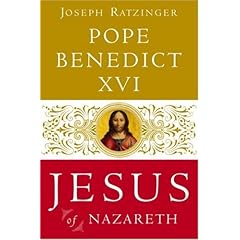 I've just finished reading Pope Benedict's Jesus of Nazareth. I really enjoyed it. If I had to describe it in one word, I'd say it's peaceful. Pope Benedict gently guides the reader to familiar scenes and sayings of Christ, and then expounds upon them quite simply. There are no big theologically fancy words or complicated explanations. And yet, I found myself again and again thinking, "Wow...why had I never seen that before?"
I've just finished reading Pope Benedict's Jesus of Nazareth. I really enjoyed it. If I had to describe it in one word, I'd say it's peaceful. Pope Benedict gently guides the reader to familiar scenes and sayings of Christ, and then expounds upon them quite simply. There are no big theologically fancy words or complicated explanations. And yet, I found myself again and again thinking, "Wow...why had I never seen that before?" For instance, in one part discussing the Torah, Pope Benedict (with help from Rabbi Neusner) explains first the importance of the Sabbath to the Jews. Then he shows how, in light of this, how shocking Jesus' words (words that I've heard repeated and repeated myself many times without considering this aspect of them) would have been.
"[Neusner] then adds: 'Not working on the Sabbath stands for more than nitpicking ritual. It is a way of imitating God.' The Sabbath is therefore not just a negative matter of not engaging in outward activities, but a positive matter of 'resting,'..."
"For Neusner, the key word rest, understood as an integral element of the Sabbath, is the connecting link to Jesus' exclamation immediately prior to the story of the disciplies plucking the ears of wheat in Matthew's Gospel...[it] reads as follows: 'Come to me, all who labor and are heavy laden, and I will give you rest. Take my yoke upon you, and learn from me; for I am gentle and lowly in heart, and you will find rest for your souls. For my yoke is easy and my burden is light" (Mt 11:28-30). This is usually interpreted in terms of the idea of the liberal Jesus, that is, moralistically. Jesus' liberal understanding of the Law makes for a less burdensome life than "Jewish legalism." This interpretation is not very convincing in practice,though, for following Christ is not comfortable - and Jesus never said it would be, either.
"What follows from this? Neusner shows us that we are dealing not with some kind of moralism, but with a highly theological text, or, to put it more precisely, a Christological one. Because it features the motif of rest, and the connected motifs of labor and burden, it belongs thematically with the question of the Sabbath. The rest that is intended here has to do with Jesus...Neusner sums up the overall content as follows: "My yoke is easy, I give you rest, the son of man is lord of the Sabbath indeed, because the son of man is now Isreal's Sabbath: how we act like God."
"...'No wonder, then, that the son of man is lord of the Sabbath! The reason is not that he interprets the Sabbath restrictions in a liberal manner...Jesus was not just another reforming rabbi, out to make life "easier" for people...No, the issue is not that the burden is light...Jesus' claim to authority is at issue...Christ now stands on the mountain, he now takes the place of the Torah.'..."
"The issue that is really at the heart of the debate is thus finally laid bare. Jesus understands himself as the Torah - as the word of God in person."
After many more "aha!" moments and connections similar to this one, in the end I'm left with a sudden desire to go back and read the Old Testament from start to finish - partly because we never much focused on the Old Testament growing up in the CoC, and also partly because with my newer Catholic outlook, and with bits and pieces of the Old Testament that were highlighted in Jesus of Nazareth, I feel like there is so much that will jump out at me now that I had glossed over so many times before.
Overall, a great book, and a great resource for unlocking the depths of Christ's words in scripture.



















